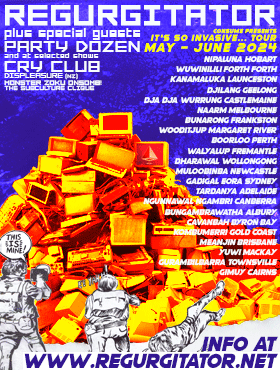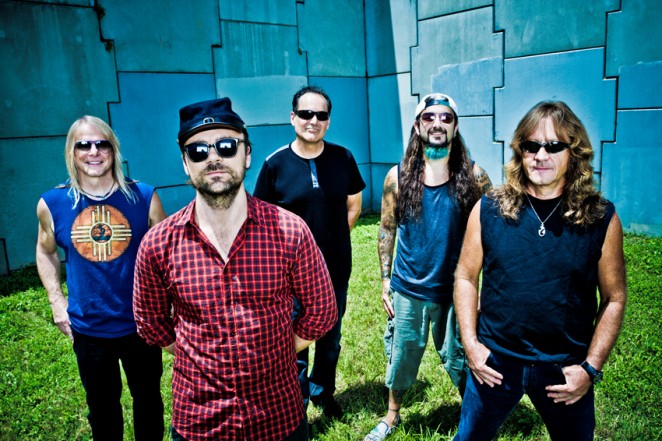Flying Colors is a supergroup of sorts, put together in 2008 by producer Bill Evans. The band features Steve Morse (Dixie Dregs, Deep Purple), Mike Portnoy (Dream Theater), Neal Morse (Spock’s Beard) , Dave LaRue (Joe Satriani, Dixie Dregs) and Casey McPherson (Alpha Rev, Indochine). Second Nature, the sophomore album from Flying Colors has just been released and is a heavenly slice of neo-prog rock. As you’d expect when you get 5 virtuosic players together in a studio, the level of musicianship is extraordinary. However, what is not always guaranteed in these collaborative situations is that the calibre of songs matches the skill of the musicians. Thankfully, this band passes that test with …. wait for it … ease! Just prior to the band heading off on an American and European tour, Australian Musician’s Greg Phillips spoke with Flying Colors bassist DAVE LARUE about his playing on the new album.
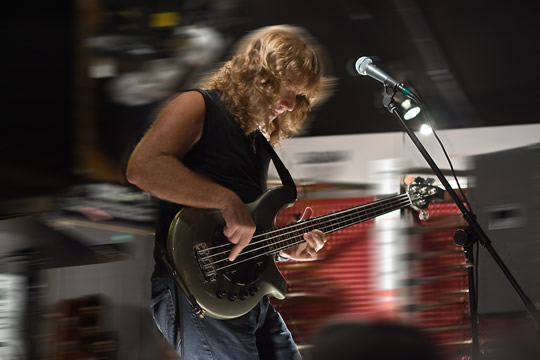 Given how this band came together, are you surprised at the results and the fact we’re talking about album number two?
Given how this band came together, are you surprised at the results and the fact we’re talking about album number two?
The initial idea was really to get Steve and Neal together, more like a co-writing thing and it led to the formation of the band. I’d worked with Steve and Mike a lot, so there was a lot of musical inbreeding. So no, I am not surprised at all having worked with most of these guys. Casey was the wild card but he fit in great. It’s a pretty intense bunch of musicians and creative people.
Vocal harmonies are a big part of this album. Some songs are quite epic. Was that plan from the start or something which developed in the studio?
It more happened in the studio I think. We don’t go in with a lot of preconceptions. We get together and people bring in ideas but that’s it. Nobody brings in songs. We build them from the ground up. There was no preconceived notion that we should make this one more of a vocal record. Everything that happens in this band is organic.
Your bass role on this record is basically lock and load but you do also get to play some free flowing notes in between the beat. Were they enjoyable sessions for you?
It’s a different role for me. I love the music and I like being part of the collaborative process with these guys but it is definitely not like playing with the Steve Morse Band or my own band. It’s rare for me to play in a band that is not a trio. To be in a 5 piece band with 3 singers is definitely different. I just feel that the music requires me to play a more functional role on a lot of the songs. It would be silly to do otherwise musically.
Having said that, on the track Mask Machine, your bass is the driving force…
I propelled it along, that’s for sure. It is funny, talking about trying to do some interesting things with the bass, a lot of the tunes have some interesting progressions. If you listen closely I tried to add some inner lines as opposed to just playing the root or simple parts but this song didn’t need anything apart from a driving bass. I played that one as straight as possible because after experimenting with it for a little while, it was like, man … adding anything in the wrong place just kills the vibe, so I just played it real heavy. Organically that seemed to be the correct approach.
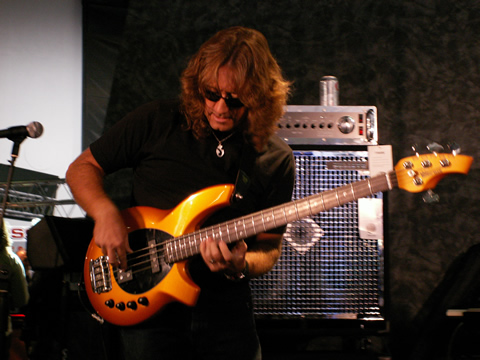 There’s a lot of clarity in your recorded bass licks. You can always hear each note very clearly. Is that something you are really conscious of with your takes in studio?
There’s a lot of clarity in your recorded bass licks. You can always hear each note very clearly. Is that something you are really conscious of with your takes in studio?
Always and I am actually not that pleased with how they ended up mixing the sound on this album. They used more of the amp tone than what I would have liked. Generally, I like even more definition and clarity, it’s a little obscure. The slap parts for me are not as bright and punchy as they should be but it’s all after the fact. I mean, my direct track sounds great. I make my living playing sessions, so I hear a lot of my tracks come back in mixed form and all the engineers are as pleased as punch with the direct track. They might EQ a little bit. They generally have better compressors than I do, so there might be some of that after the fact but yeah, I really try to play with definition and clarity.
How many takes would you normally do of your bass lines?
Well it depends. I generally take a whole day on a track. We’ve kind of sketched out the form and then I’ll listen back to the final drum tracks and then I have the luxury of experimenting. So I will try several different approaches with things. Once I have an idea about what I like and what is good, I generally do two passes of sections where I feel they’re pretty good. I’ll go back and find the best take and usually if there is something funny in that take, there’s something in the other take I can use, so I go through it twice and again, that’s after much experimentation.
How do you generally record your bass? Do you ever vary the way you record?
Generally I record direct through an Avalon 737. On this album I did all the flat tracks through that. I might EQ the bass or more often, I will switch the pick up mix. If I am slapping, I use a little more of both pick ups. If I am playing more linearly, I will move to the bridge pick up more. I like to believe that the engineer who is mixing is going to have the best ears to capture it as best possible. Sometimes that doesn’t always work out! That’s pretty much how I record everything. Once I have a direct track perfect, I will go ahead and record a miked amp or I will use some re-amping software. I use the Ampeg SVX software a lot. Basically I can set up my rig on the computer and hear it. It eliminates phase problems and stuff so I have been doin’ that a lot. That way I can change the amp however I want.
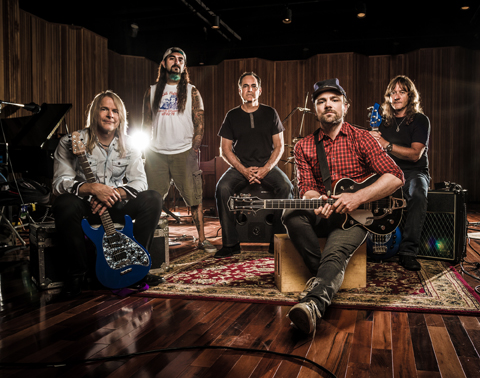 I imagine when you’re about to go on tour with whatever project, you need to tweak your gear slightly to suit the band. Touring with Flying Colors, what gear do you need to add which you may not have used for the Steve Morse Band?
I imagine when you’re about to go on tour with whatever project, you need to tweak your gear slightly to suit the band. Touring with Flying Colors, what gear do you need to add which you may not have used for the Steve Morse Band?
Actually I don’t. I have my rig and have my sound I pretty much go with that. There are a few effects which I might use differently on some songs. I have definitely dialed in more distortion because I use more distortion in this band than I do with any other band. I am pretty happy with my sound and almost every live engineer I work with is ecstatic. That’s part of me but I may vary it with certain effects but that’s about it. In this band I play a couple of songs with a pick but that’s about the only thing that is different.
What factors would dictate if you used a pick or your fingers?
Really the nature of the song. Some things just hit me and I’ll think I should do that one with a pick. Mask Machine is all pick. I felt that the driving, juggernaut, 8th note groove is more effective and especially with the distortion on it … it’s a little clearer and driving with a pick. One of the songs on the first album, Shoulda, Coulda, Woulda, I did with a pick too.
Do you always use the same strings or can that differ depending on the session?
I use pretty much the same strings. I may move to a slightly heavier gauge for this tour because we are going to tune to E flat. I am experimenting with that. I am doing so hoping the lesser tension and heavier gauge will sort of even out and be similar to what I normally use. So I don’t change that much.
You play alongside Mike Portnoy in this band. You have played alongside many drummers. What kind of drummer compliments your playing the best?
I don’t know, that’s hard to say. It’s all about making great music. One of the privileges is to both play with some of the great guitar players in the world and also some of the greatest drummers. It is a challenge and a pleasure to play with all these different styles and guys. Mike is such an energetic drummer and I love being part of the rhythm section with him. I worked with Virgil Donati in Planet X and he is an incredible player and that was very challenging. Then there’s Rod Morgenstein from the Dregs. On the other extreme there is Jeff Campitelli from the Joe Satriani band who is just a groove monster. I try to draw the music out of myself and whatever drummer I am playing with. All of those guys are such exceptional musicians, it changes my approach slightly but it’s really a matter of locking in with them all and creating some great music. I am always thinking more from a producer’s standpoint in a way … what’s needed here? What can we do to make this really rock or really groove, as opposed to oh, what can I do to show off? Different guys afford me different personalities. It’s a good point you are trying to make though … I mean Van Romaine in the Steve Morse Band, he assumes more of a functional role on drums and Steve and I … because of the nature of the music … get to step out a lot more. At least I do, Steve always does! For me, I have a much more prominent role and play a lot more solos and a lot more melodies, so Van is more of a supportive role. With Mike it’s more of a give and take. He plays over the top a lot and I have my spots, so that balance shifts a little bit with each drummer. They are all great and it is just a matter of doing what’s right for the band.
What’s happening with your second solo album?
I have been working on it forever and keep putting it off because I keep working for everyone else. I am almost done with my second one. I have a few more tracks to cut and I have one or two that I am still tinkering with. Actually, when I get back from the Flying Colors tour, that is one of my highest priorities, to get it done by the end of the year and get it out early next year.
You’re quite the bass technician and you know your theory back the front. Can you get by without that stuff?
It depends on what you want to do. Yes you can. All that the theory does is enable you to communicate and learn a little faster and to see your options. It is definitely going to help you to improvise well, it is important to know what you are doing and know how each note reacts to each other. There are certainly guys who play by ear that are phenomenal. I am not that blessed. For me it was a matter of working through all the theory and practicing to get to the point where I could express myself really well. Everybody is different. Some guys need a bit of theory and can rely on their ears. Some guys don’t need any theory. Other guys, and I fall into this category … I was greatly improved by learning the academic side of it, so to speak.
What are the chances of seeing Flying Colors in Australia anytime soon?
Well, it’s hard to say. We do hope to work more together and we are looking for those windows but right now, we are not able to forecast when that might happen. I would love to, it’s my favourite place to play. I hope we get down your way next year but we’ll see how everyone’s schedule goes and see if we can find some windows for the band to get together and play.


